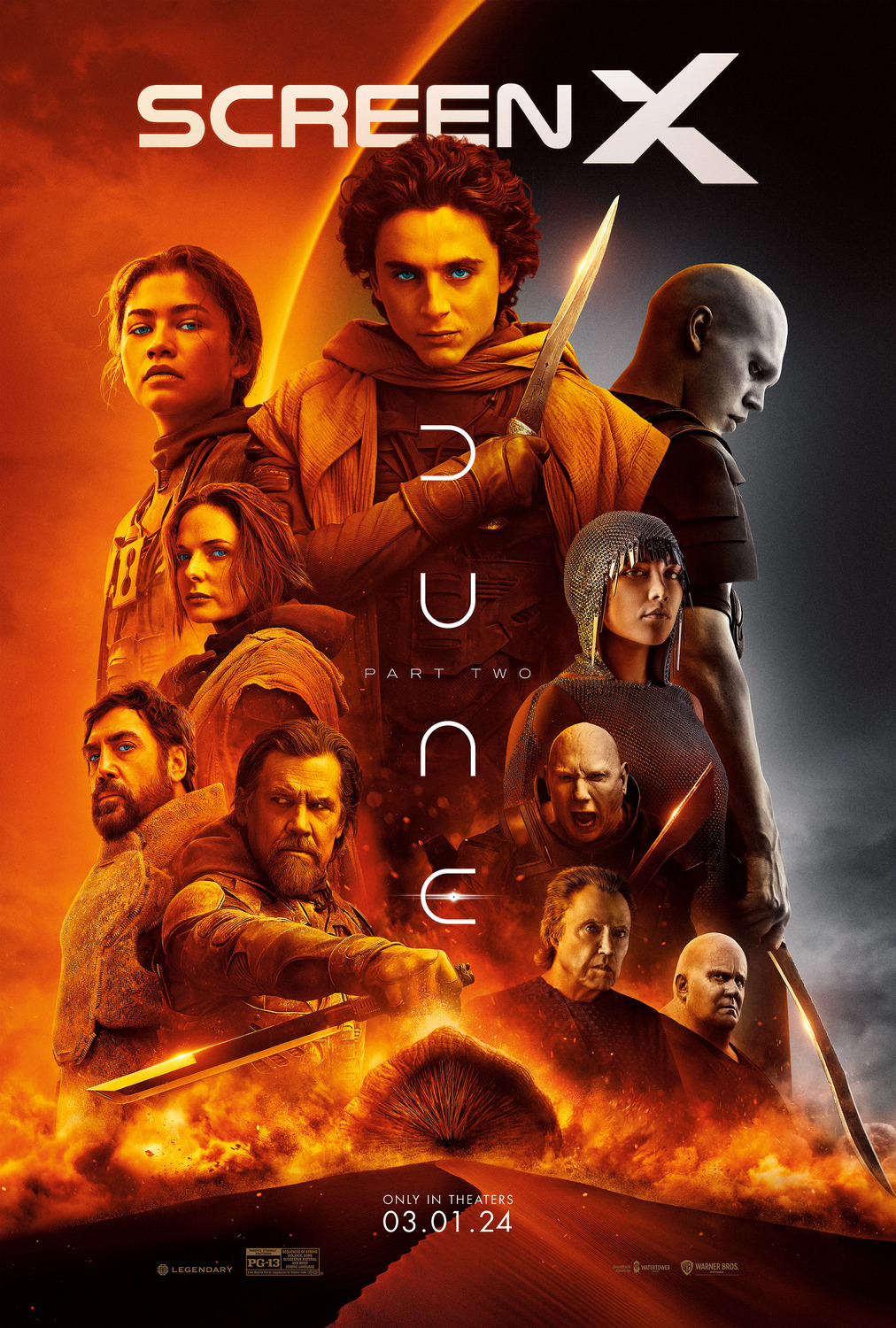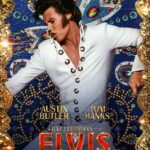Director
Denis Villeneuve
Starring
Timothée Chalamet
Zendaya
Rebecca Ferguson
Javier Bardem
Stellan Skarsgård
Austin Butler
Set immediately after the events of Dune: Part One, Paul [Chalamet] has escaped the obliteration of his house and is reluctantly taken in by Fremen leader, Stilgar [Bardem]. While in hiding, Paul resists the centuries old religious prophecies about his coming, and insists he merely wants to fight. From here a division is outlined: that of Paul’s mother Jessica [Ferguson], stoking the beliefs and signs sown by the Bene Gesserit sisterhood, and Chani [Zendaya], the girl from Paul’s vision who keeps him grounded – reminding him that he’s just a man. Meanwhile, the Harkonnen oppression of Arrakis intensifies under the foaming rage of Rabban [Dave Bautista] and the Baron [Skarsgård] positions his youngest nephew, the psychotic Feyd Rautha [Butler], as the new potential heir apparent to the galaxy’s throne.
If there’s a single word that can be used to stitch Dune Parts One and Two together, it’s consistent. Now, that may sound like an insulting or unassuming word but it’s meant as a powerful compliment. In my review for Dune Part One, I called it “legitimate cinema”, a film not intended for the middle-ground but a vision of ambitious scope, scale and majesty that will stick with you long after you leave the cinema. And Dune Part Two is no different. While the first half of this story unfolds with gentle, careful consideration, the second half preoccupies itself with the realities of ongoing war and occupation – making it a much more action-oriented, exhilarating experience. And yet, it’s still consistent; just the next chapter of a much wider story, with the same focus on its themes of manipulation through politics, religion, charm and influence.
That said, there are obviously newer, less explored aspects that help the film feel fresh. Sure, we’ve been introduced to the Fremen and Chani through dreams, we’ve seen House Harkonnen being despicable, but throughout this feature, those impressions are further cemented. And this is so important because when the houses are first introduced, it would be easy to write them off as ‘good guys’ and ‘bad guys’ but this film muddies the waters and starts to calmly explain to the audience that there are no good guys, simply a handful of opportunistic people caught up in the inescapable actions set in motion decades ago.
Subsequently, to underline the tragedy of engineered destiny, there’s a clear juxtaposition between the warmth of the Fremen community and the cold Harkonnen operation. On the one hand the believability and nuance of community within the Fremen is infectiously wonderful and brought to life with the use of subtle humour. They’re not a simple hive mind, there’s a diversity to them – they’re a complex and divided people, with a mix of traditions, drives and divisions rooted in religious fervour. Meanwhile, the Harkonnen are headed by psychotic deviants and are presented as a monolith horde who all look, think and act like one horrific synchronous consciousness.
And, in a sense, that’s the true beauty of Dune. Beneath the spectacle and majesty of what we’re watching unfold, characterisation is the key to this film. It’s a story about people. Those in charge and those who follow. And none of that works without performances that can sell you on every ounce of danger, conflict and glory. Chalamet feels like he was born to play this role, and in this half of the story, we see a more complex iteration of Paul than even in the first Dune book. Having hindsight of where the series goes, Villeneuve and Chalamet are able to craft a less doe-eyed unaware figure, and we get glimpses of self doubt, reluctance, frustration and capitulation.
And while I could reel off every supporting role, extolling their virtues, I’ll do my best to curtail it to a few highlights. First off, there was some apprehension about Austin Butler’s turn as the enigmatic Feyd-Rautha (especially with his recent seminal portrayal of Elvis). But the man gives a fantastic and truly transformative performance. Feyd exists as the other side of the coin to Paul – what could have been – a true analysis of nature vs nurture; with Butler delivering wondrously, ensuring every single scene he’s in is unforgettable. Another glorious portrayal comes from Zendaya. While we’ve been given glimpses of this character, we finally get the story of how this pair fall in love. But more than that, Chani acts as Paul’s only anchor, a sounding board for the actions he feels are unavoidable. Thus, by keeping him in check, treating him as an equal, refusing to bow, Chani is easily on of the most interesting and realistic individuals throughout the film. What’s more, she clearly loves Paul dearly, but keeps her feelings at a partial distance to ensure he doesn’t corrupt the thing she holds dearest: her people. And then we have Bardem as Stilgar. A man of nobility and belief briefly introduced in the last film but now we’re reintroduced to this richly caring and charming man. Which is all the more heartrending because underneath the surface amiability is the heart of a blinded fanatic, desperate to believe.
To regurgitate what I’ve said before, this film is a masterpiece of construction and interconnected components. The scale continues to baffle and amaze, the editing and pacing are sweeping, the cinematography is stunning, and the new additions to the (already powerful) score are hypnotic and overwhelming. In truth, it’s clear we’re witnessing something historic and truly cinematic. Visual storytelling that the medium was made for. Yes, yes, that may sound hyperbolic and biased beyond belief but it’s true. Villeneuve takes the highest of sci fi concepts and makes them palatable, without fully diluting them for the mainstream. In other words, making the inaccessible accessible. This saga truly feels like the adaptation every fan of any work dreams of. A project driven by passion and understanding of what to dial up and down, what to restructure and where – all to enhance and lean into the larger themes and motifs and create the strongest possible tale.
Once again, at time of reviewing, Dune: Part Three is not confirmed. If the story were to end here on such an open-ended ambiguity, it would suffice. But to know what’s coming… to understand that one more part with this cast and crew is in the cards is extremely exciting. If only because, in its complete form, Dune could easily stand the test of time as one of the greatest cinematic trilogies ever put to film. And, as a fan of storytelling and cinema as an art-form, what more could you want?
Release Date:
01 March 2024
The Scene To Look Out For:
To mark Feyd-Rautha’s coming of age, the Baron puts on a gladiatorial event. Everything about this scene is intoxicating. From the choice to film on infrared, the baying rabid crowd, the strange liquid fireworks in the sky, and the vicious performance from Butler. It’s all so shocking and unique.
Notable Characters:
**spoilers**
Jessica takes on an entirely different persona as the Reverend Mother. While her motivation remains the same, her ambition and intensity are ramped up significantly. Meaning that in order to achieve her goals, she is more than happy to become a darker, more manipulative and unapologetic figure. And, of course, a lot of this is driven by the co-council of one of the more out-there elements: Alia. Fans of the book were all waiting to see if we’d get a sentient toddler speaking with the wisdom of a woman in her 50s, but this compromise is handled incredibly well. That said, it’s still a bold swing and if you struggled with any of the other science fiction elements, a creepy talking foetus may be the one that pushes you over the edge.
Highlighted Quote:
“Open your mind and you will see. The beauty and the horror.”
In A Few Words:
“Confident filmmaking that continues to take no prisoners.”
Total Score: 5/5

![The Red Right Hand Movie Reviews [Matthew Stogdon]](https://reviews.theredrighthand.co.uk/wp-content/uploads/2021/12/cropped-header1.png)



